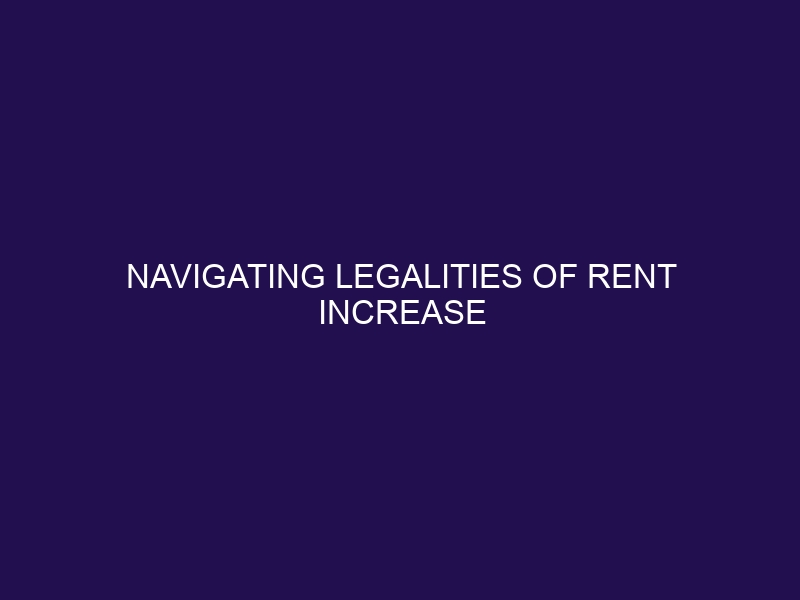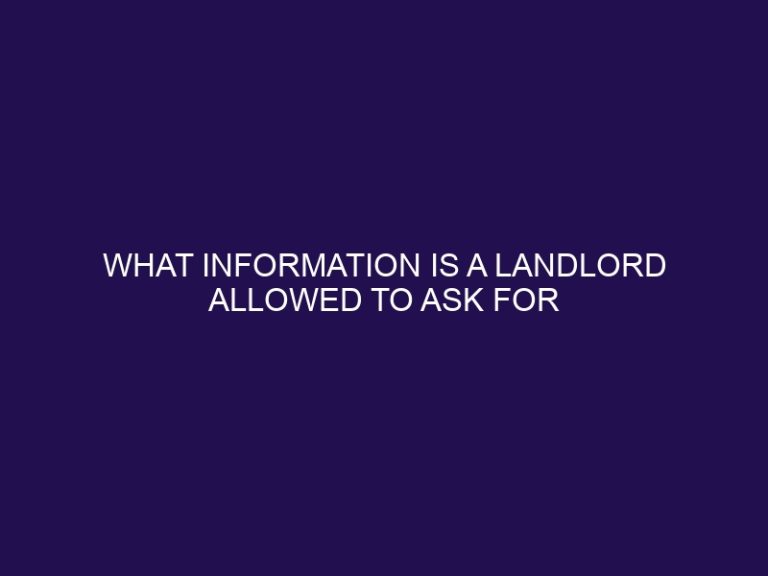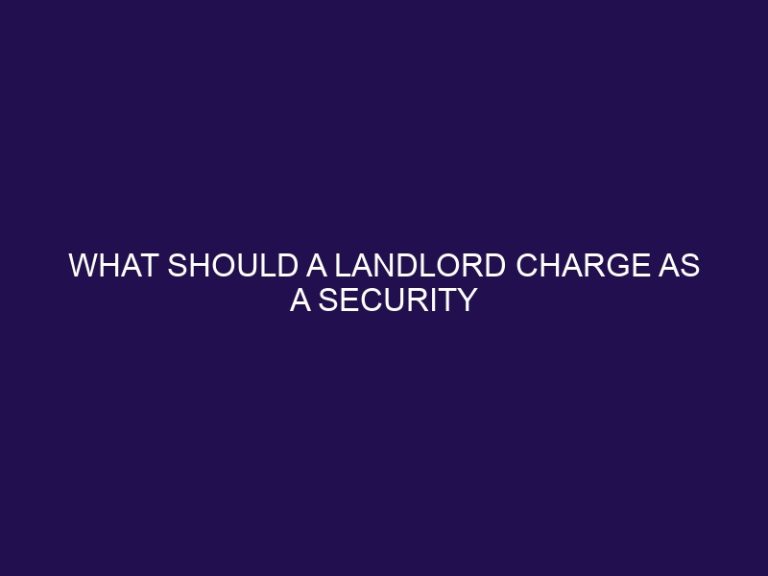Navigating Legalities of Rent Increase
A rent increase is when a landlord raises the amount of rent that a tenant pays for their rental property. It is a common practice in the rental market and can be a stressful and overwhelming experience for both tenants and landlords. Understanding the legalities of rent increase is crucial for both parties to ensure a fair and legal process.
Landlords typically increase rent to keep up with rising costs, such as property taxes, maintenance fees, and inflation. Various factors come into play when determining the amount of rent increase, including the current market rates, location, property demand, and the terms of the lease agreement.
When it comes to the legalities of rent increase, both landlords and tenants have specific rights and obligations that must be followed. The laws surrounding rent increase vary by state, so it is essential to know the specific regulations in your area. In general, landlords are required to provide written notice of the rent increase and adhere to any rent control laws in the area. Tenants have the right to challenge the rent increase if they believe it to be unreasonable or discriminatory.
Handling a rent increase can be daunting, but there are steps that tenants can take to negotiate or handle the situation. Some of these steps include:
- Researching the current rental market
- Discussing the reasons for the rent increase with the landlord
- Possibly negotiating a long-term lease to avoid future increases
If a tenant cannot afford the rent increase, they may have the option to move out or seek assistance from government programs or local organizations. However, not paying a rent increase can have severe consequences, such as eviction and a negative impact on credit.
To avoid rent increases, tenants can consider alternatives to renting, such as purchasing a home or negotiating a long-term lease. Landlords can also explore options like offering incentives to tenants or investing in upgrades to justify a rent increase.
In conclusion, understanding the legalities of rent increase is crucial for both landlords and tenants. By knowing the laws, rights, and options available, both parties can navigate this process in a fair and legal manner.
What Is a Rent Increase?
A rent increase is when a landlord raises the rental fees for a property. This is a lawful action taken to align the rent with current market rates or to cover any increased expenses for the property. If a tenant is faced with a rent increase, it is important to review their lease agreement and be aware of their rights as a tenant in the local area.
Why Do Landlords Increase Rent?
Landlords often increase rent for multiple reasons, including rising property taxes, maintenance costs, inflation, and market rates. This allows them to generate higher returns on their property investments. A historical example of this can be seen in the 1970s when many landlords raised rent due to escalating inflation and property maintenance expenses.
What Factors Determine Rent Increase?
Factors such as market demand, property location, inflation, property upgrades, and local regulations determine rent increase. For instance, in high-demand urban areas, landlords may raise rent due to increased demand for housing.
What Are the Legalities of Rent Increase?
When considering the legalities of rent increase, it is important to have a thorough understanding of local laws, lease agreements, and tenant rights. For example, landlords are required to give ample notice and must follow specific percentage limits. In 1983, the Rent Stabilization Ordinance was established in Los Angeles, setting a precedent for rent control policies across the country.
What Are the Laws Surrounding Rent Increase?
Laws surrounding rent increase vary by location, typically covering notice periods, percentage limits, and reasons for increases. It’s important to have a thorough understanding of the local regulations and seek legal advice if there is any uncertainty.
Tenants should also be knowledgeable about their rights when it comes to rent hikes, ensuring that they are in compliance with the law.
What Are the Tenant Rights During a Rent Increase?
When facing a rent increase, tenants have specific rights that must be respected. These rights include receiving a formal notice within the legally required timeframe, which is typically 30-60 days. Additionally, tenants have the right to negotiate the increase and understand the reasons behind it, promoting transparency and fairness throughout the process.
What Are the Landlord Obligations During a Rent Increase?
Landlord obligations during a rent increase include:
- Providing written notice within the required timeframe.
- Complying with local rent control laws.
- Ensuring that the increase is reasonable and non-discriminatory.
- Additionally, landlords may need to offer options for lease renewal or negotiate terms with tenants.
How to Handle a Rent Increase?
- Review the terms and conditions of the lease agreement.
- Understand your legal rights regarding rent increase.
- Discuss with your landlord to see if negotiation is possible.
- If negotiations fail, consider seeking legal advice.
What Are the Steps to Negotiating a Rent Increase?
- Assess Market Rates: Research similar properties to gauge the reasonableness of the proposed rent increase.
- Communicate: Initiate a respectful conversation with the landlord to understand their reasoning behind the increase.
- Negotiate: Propose a compromise, such as a phased increase or an extended lease, in order to come to a mutually beneficial agreement.
When negotiating a rent increase, maintaining open communication and exploring mutually beneficial solutions can help foster a positive relationship between landlord and tenant.
What Are the Options if You Cannot Afford the Rent Increase?
Explore options if you are unable to afford the rent increase:
- negotiate a phased increment
- seek financial assistance
- or discuss a longer lease for stability
Additionally, consider:
- shared housing
- downsizing
- or relocating to a more affordable area
What Are the Consequences of Not Paying a Rent Increase?
If a tenant fails to pay a rent increase, they may be at risk of eviction or facing legal action. This can have a negative impact on their rental history and credit score. For instance, a tenant in my building experienced eviction for not paying the rent increase, resulting in financial difficulties and ultimately having to move out.
How to Avoid Rent Increase?
- Sign a long-term lease agreement.
- Maintain a good tenant-landlord relationship.
- Take care of the property.
- Be aware of local rent control laws.
To avoid rent increase, consider proposing to perform maintenance or improvements in exchange for a stable rent.
What Are the Alternatives to Rent Increase?
Seeking alternatives to rent increase involves exploring various options such as:
- Property improvements
- Adding amenities
- Offering long-term leases with fixed rates
Landlords can also consider implementing cost-cutting measures or taking advantage of tax incentives to lessen the need for raising rent.
How to Negotiate a Long-term Lease?
- Research: Gain a thorough understanding of the local rental market and property values.
- Discuss: Initiate a conversation with the landlord about negotiating a long-term lease, emphasizing stability and commitment.
- Offer Incentives: Propose a rent freeze or slight increase in exchange for a multi-year lease to sweeten the deal.
- Seek Legal Advice: Consult with a real estate attorney to review and ensure favorable lease terms before finalizing the agreement.
Summary
Understanding the legalities of rent increases is crucial for both tenants and landlords. It is important to be familiar with local laws, lease agreements, and notice requirements. If there is any uncertainty, seeking legal advice is recommended.
When discussing rent adjustments, it is essential to communicate openly and professionally.
Frequently Asked Questions
What is the role of a property management company in navigating the legalities of rent increases?
A property management company plays a significant role in ensuring peace of mind and housing stability for both tenants and landlords. They have a deep understanding of governing laws and regulations, which allows them to make informed decisions when updating lease agreements and determining rent hikes.
What are the different legal limitations that landlords and property managers must adhere to when increasing rent?
Landlords and property managers must abide by federal laws, state laws, and local regulations when increasing rent. Some important limitations to note include notice duration, rent control measures, and fair treatment of tenants.
What is the typical notice duration for rent increases in most states?
The notice duration for rent increases varies depending on the state, but in most states, it is at least one month. This notice must be formally conveyed through certified mail or hand-delivered to the tenant or a close family member.
What are some factors that can contribute to a rent increase in rental properties?
Rent hikes can be caused by a variety of factors, including rising property taxes, increased operating costs, inflation, changes in demand and market conditions, and the need to cover expenses related to property maintenance, repairs, and improvements.
How do market dynamics and demand for rental properties impact rent rates and allowable percentage increases?
Market conditions and demand for rental properties play a significant role in determining rent rates and allowable percentage increases. In a saturated market with high demand, landlords may be able to impose higher allowable rent increases, while in a declining market with lower demand, rent rates may need to be adjusted accordingly to strike a balance for both landlords and tenants.
How can a trustworthy property management company help navigate the legal landscape of rent increases?
A trustworthy property management company, like KeyVest Property Management, has a deep understanding of federal, state, and local laws and regulations. This allows them to confidently and clearly navigate agreements and communicate with both landlords and tenants, fostering trust and ensuring legal compliance.







